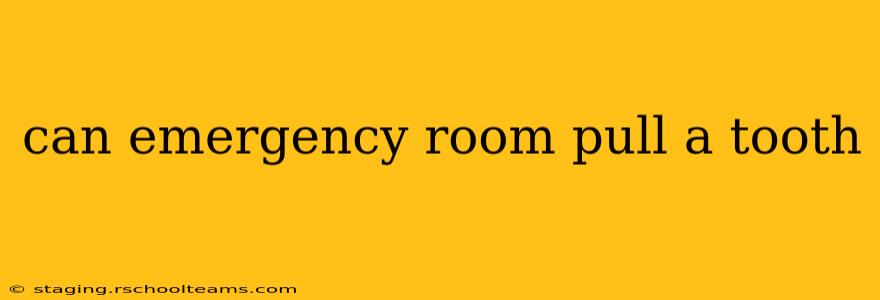Can an Emergency Room Pull a Tooth?
The short answer is: sometimes, but not always. Emergency rooms (ERs) are designed to handle life-threatening and urgent medical situations. While a severely painful or infected tooth can certainly cause significant distress, it usually isn't considered a life-threatening emergency in the same way as a heart attack or stroke. Therefore, tooth extraction is not a routine service provided by most ERs.
Let's delve deeper into the circumstances under which an ER might extract a tooth and when you should seek alternative care.
When Might an ER Extract a Tooth?
An ER might consider tooth extraction in a few limited, critical situations:
-
Severe Trauma: If a tooth is severely damaged due to an accident (e.g., a sports injury or car accident), causing significant bleeding or posing a risk of further injury, the ER might remove it to stabilize the situation and prevent complications. The focus here is on managing the immediate trauma, not necessarily providing comprehensive dental care.
-
Severe Infection with Systemic Symptoms: In rare cases, an extremely severe tooth infection (abscess) could spread and cause systemic complications, like a dangerously high fever or spreading infection. In such a life-threatening scenario, tooth extraction might be performed to control the infection and save the patient's life. This is a last resort measure, and the ER physician will likely consult with an oral surgeon if possible.
-
Compromised Immunity: For patients with severely compromised immune systems (e.g., due to cancer treatments), a severe dental infection could become life-threatening much faster. The ER might prioritize extraction to reduce the risk of sepsis in these vulnerable individuals.
When Should You NOT Go to the ER for a Toothache?
For the vast majority of dental emergencies, the ER is not the appropriate place to seek treatment. Here are situations where you should seek alternative care:
-
General Toothache: A simple toothache, even a severe one, is best addressed by a dentist or emergency dental clinic. These professionals have the specialized tools and expertise to diagnose and treat the underlying cause effectively.
-
Loose Tooth (Not from Trauma): A loose tooth that isn't the result of a recent injury should be examined by a dentist. They can determine the cause of the looseness and the best course of action.
-
Chipped or Cracked Tooth (Minor): Minor chips or cracks can often be managed by a dentist with bonding or other restorative procedures. The ER is unlikely to have these capabilities.
What are my other options for dental emergencies?
For most dental emergencies, you should contact:
-
Your dentist: If possible, contact your regular dentist. They will be able to advise you on the best course of action.
-
An emergency dental clinic: Many cities and towns have 24/7 emergency dental clinics specifically designed to handle urgent dental problems.
-
Urgent care facility: While not a replacement for a dentist, some urgent care facilities have dentists or access to dental referrals.
What should I do if I think I need emergency dental care?
If you are experiencing a serious dental emergency, call your dentist or an emergency dental clinic immediately. If you are bleeding profusely or exhibiting signs of a life-threatening condition, then seek emergency medical attention immediately by calling emergency services or going to the nearest hospital emergency room. Explain the nature of your dental emergency clearly to the dispatchers or hospital staff.
Remember, visiting an emergency room for a non-life-threatening dental issue can lead to long waits, high costs, and unnecessary resource consumption. Choosing the right healthcare provider for your specific need is crucial for efficient and effective treatment.
